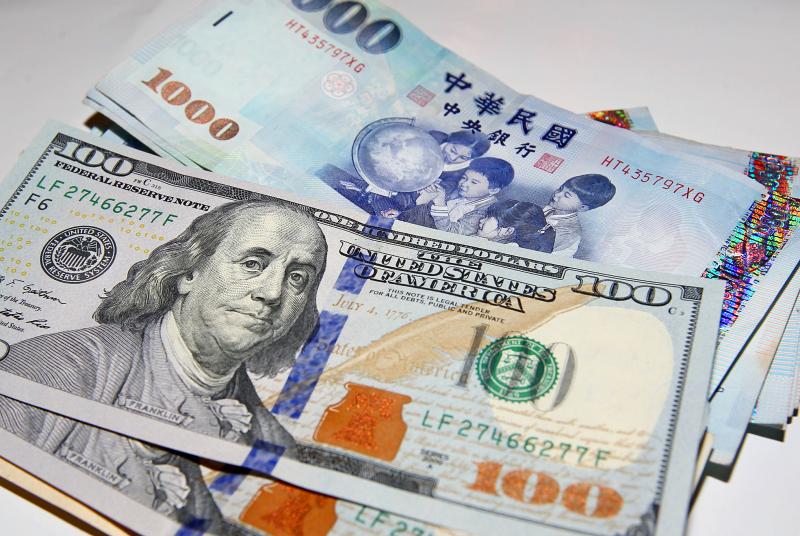Taiwan’s foreign exchange reserves last month picked up US$3.8 billion to US$548.5 billion, ending two months of decline, thanks to seasonal dividend income from bond holdings and value gains in non-US dollar reserve currencies, the central bank said yesterday.
The latest balance indicated that Taiwan retained its status as the world’s fourth-largest foreign reserve holder after China, Japan and Switzerland, after overtaking India in April.
“The central bank’s holdings in US government bonds received a boost from seasonal dividend incomes and value advances in major reserve currencies other than the greenback,” Department of Foreign Exchange Director-General Eugene Tsai (蔡炯民) told a news conference in Taipei.

Photo: CNA
The euro last month rose 2.27 percent against its US counterpart, while the British pound increased 1.07 percent and the Japanese yen grew 1.99 percent, Tsai said.
The central bank intervened in the local foreign exchange market to maintain stability in the local currency and achieved a neutral effect due to the moderate amount involved, he said.
The local foreign exchange market was volatile last month, with many wondering how far the US dollar’s appreciation would go, Tsai said, adding that the greenback weakened in the second half of the month after economic uncertainty loomed, raising hope that the US Federal Reserve would ease monetary tightening.
Such expectations lent support to emerging market currencies including the New Taiwan dollar, he said.
That explains why foreign stock players modestly increased holdings in local shares, but pressed ahead with net capital flight of US$1 billion to pursue higher yields elsewhere, he added.

Macronix International Co (旺宏), the world’s biggest NOR flash memory supplier, yesterday said it would spend NT$22 billion (US$699.1 million) on capacity expansion this year to increase its production of mid-to-low-density memory chips as the world’s major memorychip suppliers are phasing out the market. The company said its planned capital expenditures are about 11 times higher than the NT$1.8 billion it spent on new facilities and equipment last year. A majority of this year’s outlay would be allocated to step up capacity of multi-level cell (MLC) NAND flash memory chips, which are used in embedded multimedia cards (eMMC), a managed

CULPRITS: Factors that affected the slip included falling global crude oil prices, wait-and-see consumer attitudes due to US tariffs and a different Lunar New Year holiday schedule Taiwan’s retail sales ended a nine-year growth streak last year, slipping 0.2 percent from a year earlier as uncertainty over US tariff policies affected demand for durable goods, data released on Friday by the Ministry of Economic Affairs showed. Last year’s retail sales totaled NT$4.84 trillion (US$153.27 billion), down about NT$9.5 billion, or 0.2 percent, from 2024. Despite the decline, the figure was still the second-highest annual sales total on record. Ministry statistics department deputy head Chen Yu-fang (陳玉芳) said sales of cars, motorcycles and related products, which accounted for 17.4 percent of total retail rales last year, fell NT$68.1 billion, or

In the wake of strong global demand for AI applications, Taiwan’s export-oriented economy accelerated with the composite index of economic indicators flashing the first “red” light in December for one year, indicating the economy is in booming mode, the National Development Council (NDC) said yesterday. Moreover, the index of leading indicators, which gauges the potential state of the economy over the next six months, also moved higher in December amid growing optimism over the outlook, the NDC said. In December, the index of economic indicators rose one point from a month earlier to 38, at the lower end of the “red” light.

MediaTek Inc (聯發科) shares yesterday notched their best two-day rally on record, as investors flock to the Taiwanese chip designer on excitement over its tie-up with Google. The Taipei-listed stock jumped 8.59 percent, capping a two-session surge of 19 percent and closing at a fresh all-time high of NT$1,770. That extended a two-month rally on growing awareness of MediaTek’s work on Google’s tensor processing units (TPUs), which are chips used in artificial intelligence (AI) applications. It also highlights how fund managers faced with single-stock limits on their holding of market titan Taiwan Semiconductor Manufacturing Co (TSMC, 台積電) are diversifying into other AI-related firms.